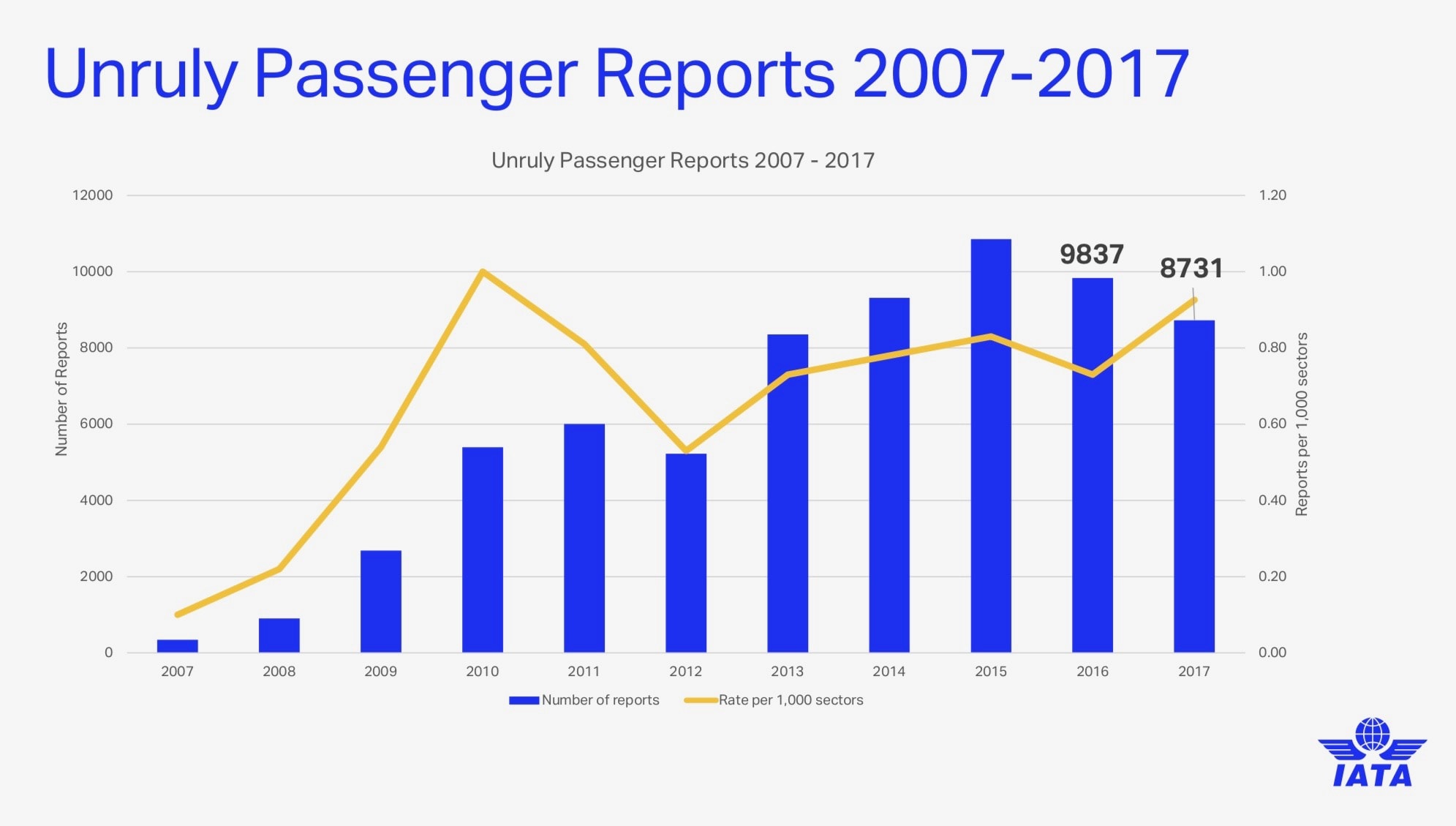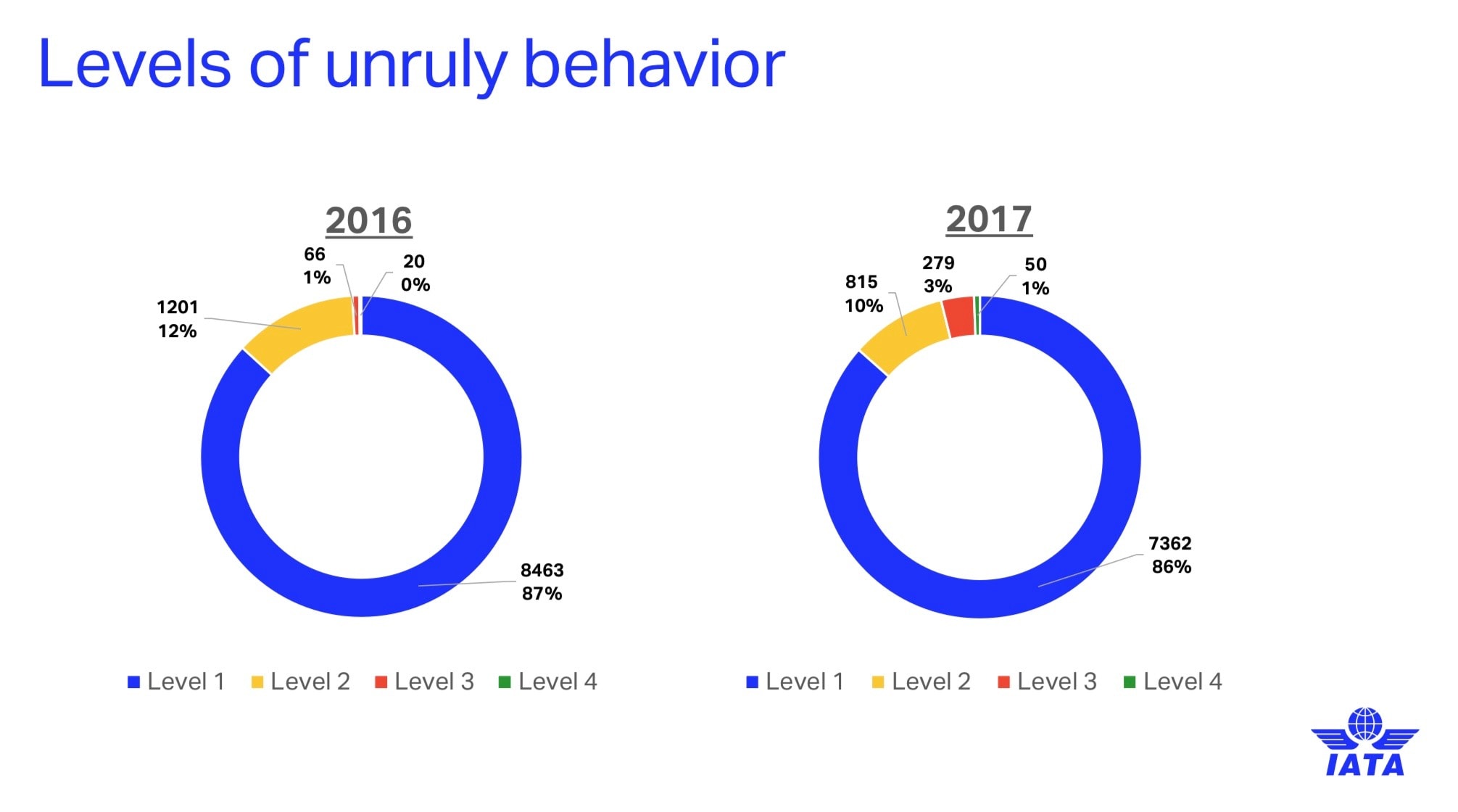Unruly Passenger Incident Rate Rises, IATA Data Shows
Share

At IATA’s Global Media Day this week, Tim Coleman, assistant director of External Affairs at IATA, reported a higher rate of unruly passenger behavior in the cabin in 2017 compared to 2016, with the number of most severe cases doubling.
According to IATA, in 2017, there was one unruly passenger incident for every 1,053 flights – higher than the 2016 incident rate of one incident every 1,424 flights. Overall, incidents reported were lower (8,731 during 2017 versus 9,837 during 2016) but the total number of reported incidents does not give a complete picture of the problem.

These figures are generated from the IATA STEADES (Safety Trend Evaluation, Analysis and Data Exchange) database but do not count incidents on airlines which are not IATA members, explained Tim Coleman, assistant director of External Affairs, IATA. Further, not all IATA members may choose to submit incident data for a particular year. “It is likely that the statistics significantly underestimate the extent of the issue,” he cautioned.
The shift towards more severe incidents is of concern. IATA categorizes unruly behavior in four levels: Level 1, which can include verbal aggression or failure to comply with crew instructions; Level 2 including physical aggression or lewdness against fellow passengers or crew and damage to the cabin; Level 3 which includes threats to life, and presenting of weapons onboard; and Level 4 which includes a breach of the flight deck (intended or unintended), an act of sabotage or a credible threat of seizing the aircraft.
In 2017, 86% of incidents were Level 1 incidents, compared to 87% of 2016 incidents. Level 2 incidents also declined, from 12% in 2016 to 10% of all incidents in 2017. Level 3 incidents increased from 1% in 2016, to 3% in 2017, and Level 4 incidents more than doubled from 20 reported in 2016 to 50 incidents reported in 2017. Though Level 4 incidents are still extremely rare – at 1% of all reported incidents – the severity of the threat can not be ignored.

One Too Many
IATA also reported the three most commonly occurring unruly behaviors: non-compliance with smoking rules (24% of all incidents), intoxication (27%), and failure to adhere to safety regulations (49%).
In 2017, there were 2,454 incidents of intoxicated behavior, of which 561 involved passengers consuming alcohol they had brought onboard. IATA cited figures from the UKCAA which show a 325% rise in unruly passenger behavior reports from 2013 (98) to 2017 (417). Alcohol was identified as the main cause of disruptive behavior in many of these incidents, with a general spike during the summer months and on routes to destinations popular with holiday makers.
IATA partnered with UK aviation stakeholders to raise awareness of the risks of disruptive behavior during this year’s summer travel season with a campaign on both traditional and social media. “Its aim was to collectively remind passengers of the personal consequences of disruptive behavior when traveling by air – whether that’s denied boarding, a [£5,000] fine and/or a [two year] prison sentence, or missing your holiday,” Coleman said. “The message was simply, we don’t want to stop your fun, but wait until you get to the destination before you get the party started.”
The “One Too Many” campaign will continue with a winter version targeting flights to ski destinations. IATA is also working with EASA to develop a passenger education campaign to be launched in early 2019.
The Montreal Protocol
Passengers are getting fed up with misbehaving fellow-travelers too. According to a poll of 2,500 passengers in five geographies, conducted by Rockland Dutton Research and Consulting on behalf of IATA, 32% of flyers surveyed had witnessed unruly or inappropriate behavior over the previous six months; 80% of them thought the perpetrators should be subject to criminal prosecution.
Because flights connect different jurisdictions, prosecution and enforcement of penalties can be difficult. The Montreal Protocol 2014 addresses the legal gap, but must be ratified by 22 ICAO member states to bring it into force. Only 15 have ratified MP14, so far, with Singapore being the most recent to do so. Kuwait and Malaysia are expected to ratify by the end of 2018. France, Spain, Turkey, UAE and others are advancing towards ratification in 2019.
“The ICAO triennial assembly takes place next September, with many ministers attending so it’s a good opportunity for depositary actions to take place. IATA will present a working paper to remind states of the need to ratify,” Coleman said. “We certainly need larger aviation states that sit on the ICAO council such as Australia, Canada, China, the US and the UK to demonstrate leadership and urgently ratify MP14 so we have uniformity and stronger international deterrent.”


